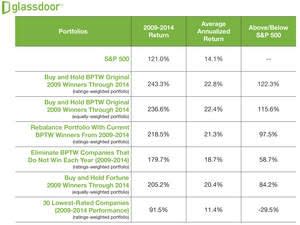Multi-Year Financial Analysis Shows Public Companies Recognized for High Employee Ratings Outperform S&P 500 by 122%
Lowest Rated Companies Underperform S&P by 29.5%

MILL VALLEY, CA--(Marketwired - Mar 11, 2015) - Employee sentiment is an increasingly valuable factor investors are using to determine the health and amount of risk that may be associated with a company's financial future. A new report from Glassdoor Research, "Does Company Culture Pay Off?" explores the trends and correlations between company culture and stock performance of public companies.
"Based on our multi-year analyses, we find a meaningful economic link between intangible company assets such as employee satisfaction and broader stock market performance among publicly held companies," said Glassdoor Chief Economist Dr. Andrew Chamberlain. "Like any financial asset, a satisfied and engaged workforce is a highly valuable attribute of companies. Since companies infrequently release internal survey data to investors, public sources of information like company reviews and third-party 'best of' lists are proving to be valuable predictive tools of financial performance."
In the "Does Company Culture Pay Off?" report, Glassdoor Research conducted three studies that evaluated: (1) whether public companies on Glassdoor's 50 "Best Places to Work" list1 (through three possible portfolios) and Fortune's 100 "Best Companies to Work For" list outperform the overall stock market, (2) whether being named to the annual Glassdoor list affects short-term stock prices, and (3) whether being low rated, according to company reviews on Glassdoor, is associated with lower stock returns than the overall stock market.
3 Portfolios of High-Rated Companies Outperform S&P 500
Within the first study, the report evaluates three types of possible portfolios tracking public companies on Glassdoor's "Best Places to Work" list -- each one broadly outperforming the S&P 500 from 2009 to 2014.
In the first portfolio, stocks of public companies on the inaugural 2009 Glassdoor list were bought in 2009 and held through 2014, the original class portfolio, investors would see an outperformance of 122.3 percent compared to the S&P 500. This portfolio of companies returned 243.3 percent versus the S&P 500 return of 121 percent during the same period. If you were to invest $1,000 into the "original class" portfolio it would yield $3,470 by 2014.
A second portfolio consisting of buying each new class of public company winners and holding them for one year, the rebalancing portfolio, would result in an outperformance of 97.5 percent compared to S&P 500 results. If $1,000 was invested into this "rebalancing" portfolio in 2009, by 2014 an investor would see a return of $3,185.
And in a third portfolio, the elimination portfolio, investing in only repeat public company winners on the Glassdoor lists, investors would see outperformance of 58.7 percent compared to the overall market, yielding $2,797 by 2014 had they invested $1,000 into this portfolio.
When comparing the first portfolio of Glassdoor's "Best Places to Work," public companies captured since the list's original class for 2009, the report highlights that these businesses outperformed the S&P 500 by 115.6 percent on an equally-weighted basis, whereas a similar portfolio of Fortune's "Best Companies to Work For" public companies outperformed the S&P 500 by 84.2 percent.
Low Rated Companies Deliver Lower Returns
In another study, the 30 publicly traded companies on Glassdoor with the lowest overall company ratings as of January 31, 2015 were evaluated for stock returns. The report shows lower rated companies significantly underperform the market. Between 2009 and 2014, the S&P 500 earned a return of 121 percent. By contrast, a ratings-weighted portfolio of low-rated companies earned just 91.5 percent, underperforming the S&P 500 by 29.5 percent.
"This provides further evidence of an economic link between employee satisfaction and company financial performance," adds Chamberlain.
Event Study Shows Jump In Stock Following Public Announcement of Winners
An event study was used to evaluate if there is a direct link from being named a Glassdoor "Best Place to Work" to the short-term stock return of the winning public companies. Results show that being named a "Best Place to Work" between 2009 and 2014 led to a roughly 0.75 percent jump in stock returns during the 10 days after the announcement. While small, this statistically significant effect, if annualized, equates to roughly 31 percent.
See the full Glassdoor Research Report "Does Company Culture Pay Off?": http://www.glassdoor.com/blog/company-culture-pay
Follow @Glassdoor for additional company updates and jobs and recruiting reports. Follow @ADChamberlain on Twitter for more reports on labor economics, jobs trends and the impact of workplace transparency.
About Glassdoor
Glassdoor is the most transparent jobs and career marketplace that is changing how people search for jobs and how companies recruit top talent. Glassdoor combines free and anonymous reviews, ratings and salary content with job listings to help job seekers find the best jobs and address critical questions that come up during the job search, application, interview and negotiation phases of employment. For employers, Glassdoor offers recruiting and employer branding solutions to help attract high-quality candidates at a fraction of the cost of other channels. Glassdoor, which has more than 27 million members and content from more than 190 countries, operates one of the most popular job apps on iOS and Android. The company launched in 2008 and has raised approximately $160 million from Google Capital, Tiger Global Management, Benchmark, Battery Ventures, Sutter Hill Ventures, DAG Ventures, Dragoneer Investment Group and others.
Glassdoor.com is a registered trademark of Glassdoor, Inc.
1Glassdoor Best Places to Work, also known as the Employees' Choice Awards, is based entirely on company reviews employees voluntarily and anonymously share on Glassdoor throughout the prior year. The 2009 inaugural list debuted in December 2008. For complete award methodology, contact pr@glassdoor.com
Image Available: http://www2.marketwire.com/mw/frame_mw?attachid=2781428
Image Available: http://www2.marketwire.com/mw/frame_mw?attachid=2781431

